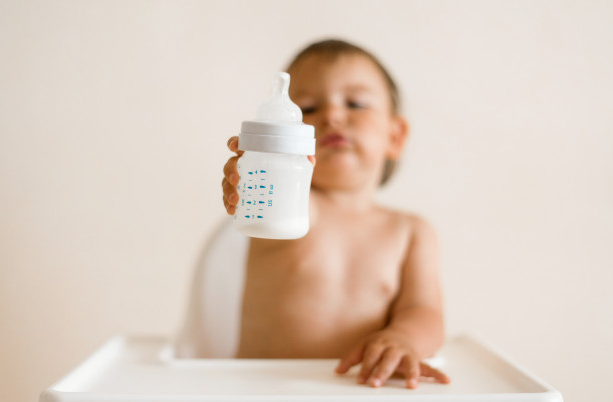Recent Articles

How Many Times Can You Safely Reheat Breast Milk?
Learn how to safely reheat breast milk without compromising its nutritional value. Discover expert guidelines on how many times to reheat, best practices, and when to avoid reheating altogether. Ensure your baby receives the optimal benefits of your breast milk.

Getting Started With Solids
Empower Your Baby's Journey to Solid Foods with Levaapp
Embark on the exciting adventure of introducing solids to your little one with Levaapp's comprehensive guide. Discover when and how to introduce purees, move onto chunkier textures, and embrace self-feeding. Equip yourself with expert advice on introducing a sippy cup and spoon, all while ensuring your baby's nutritional needs are met with wholesome, delicious foods.
Keywords: solids, baby food, purees, sippy cup, spoon, nutrition, healthy eating, weaning, parenting

Mom Rage is a Real Thing
Mom rage can't be a real thing, can it? Moms are all about love and cuddles, smiles and kisses, hugs, and happy things, right? A mother will move mountains for her children, shielding them with love and care. There is no feeling stronger than a mother's love. But moms are also human. And being a mother is considered one of the most demanding and challenging jobs there is. It’s no surprise that they may experience rage at times. Read on to learn about mom rage and how to deal with it.

Carpal Tunnel Syndrome and Breastfeeding
Carpal tunnel syndrome (CTS) is a well-known condition caused by increased pressure on the median nerve in the wrist. The median nerve runs from the forearm through a passageway in the wrist (carpal tunnel) to the hand. It provides sensation to the palm side of the thumb and fingers, but not the little finger. The nerve is affected by the intense pressure from a build-up of swelling, which causes a loss in sensation in the fingers.

Can I Take Cough Mixture While Breastfeeding?
Certain cough syrups may also pose a potential danger to the infant. It is good to understand why and what ingredients to watch out for.

How Does Exercise Affect My Breastmilk?
However natural breastfeeding is, it may not come easy for some moms - many of us have to put in a lot of effort to increase our milk supply. So it is no wonder that we were very wary of anything that may compromise that precious nectar, including exercise.

When Should I Give My Baby Water?
Water is essential for life. The human body needs water to function properly because it carries nutrients and oxygen to cells, protects body organs and tissues, and helps the kidneys and liver flush out waste products. Water essentially balances all our bodily systems. An adult should drink about 3 liters of fluid per day.
However, as counterintuitive as it may seem, babies under the age of six months should not be fed water, read on to learn why.

The Benefits of Babywearing
Babies that are "worn" in a carrier benefit on an emotional level because they crave close contact with their caregivers. Studies have shown that it can lead to 43% less crying, especially in the late hours of the day when they may be exhausted. Babies feel more comforted and cry less when carried closely. Read on to learn more about the benefits of carrying your baby in a sling.

Night Terrors in Children
After a long day of learning and playing, the best feeling in the world is to tuck that sleepy little face into bed. You hope that your little one will fall sound asleep and not wake up until the morning. However, many children experience night terrors or sleep disturbances, which can make life difficult for everyone. Night terrors can cause long-term sleep issues, so it is essential that you know how to deal with them. In this article, you will learn about night terrors, what they are, why they occur, and how to prevent them.

Constipation in Toddlers
When your child was a baby, their bowel patterns were different. As your baby grows, the gastrointestinal tract matures, and the number of bowel movements per day decreases. Some sources say that children should generally have at least one bowel movement per day or a bowel movement at least three to four times a week. Therefore, it is essential to identify your child's usual bowel pattern so that if it deviates from their typical pattern, you will be aware that something might be wrong, or it may be constipation.

How Much Weight Should My Baby Gain?
One of the most exciting things about being a parent is watching your baby grow. However, it's sometimes difficult to know how fast your baby should grow or whether they are putting on the right amount of weight for their age. This article will outline the average weight of your baby at birth, how much weight your baby should gain every week until they are a few months old, what affects their weight gain, and when you should be worried about your baby’s weight gain.

Why Do Newborns Lose Hair on Their Heads?
If you are a first-time parent, you might wonder if hair loss is normal for infants. Read on to find out more about the patterns of hair growth and hair loss in babies and why hair loss occurs. You will also learn when your baby's hair will grow back and what you can do to prevent your baby's hair from falling out.

Observing Your Worry
Having a newborn is a constant source of worry for new moms. These negative feelings accompany us through every stage of life and get more intense once we deal with the uncertainty of being responsible for another human being. However, when worries spin out of control can be very detrimental and bring a lot of anxiety. Therefore, observing and being aware of your worry allows you to manage it better.

When To See the Doctor if Your Baby Has a Cold
Coughs and colds are some of the most common complaints for which a parent seeks advice from their doctor for their baby. Most of the time, coughs and colds are harmless and go away independently, causing only minor inconveniences and minimal worry. However, there are times that coughs and colds become more serious and can disrupt your baby’s routines and daily activities. This article will describe what causes cough and colds, when you should see a doctor, and when you should worry about your child's symptoms.

What Can Babies See?
It is always a joy to see a baby. Having a baby gives light to a room and a smile to people's faces. But have you ever wondered what babies can see? When do they start to see our smiles? Even before your baby learns to sit, crawl, walk or talk, your baby’s eyes are already silently observing and absorbing information about the surroundings. In this article, you will find out how your babies develop their vision, when babies start to see, how their vision develops, and how to bond with your babies with their vision development in mind.

How Does Vitamin D Deficiency Affect Development?
Vitamin D is an essential nutrient for our health, as it helps regulate the absorption of calcium and phosphate in our bodies. It is needed to grow strong bones, muscles, and teeth. Its deficiency is associated with different health issues. The consequences of vitamin D deficiency in infancy usually appear as seizures caused by too low blood calcium, difficulty breathing, and rickets, a condition that affects bone development in children and causes bone pain, poor growth, and soft, weak bones that can lead to bone deformities.

Putting the Cap on Cradle Cap
Cradle cap is a self-limiting disease, meaning it resolves on its own. However, because it is a chronic inflammatory disease, it might take some time for the condition to improve and disappear. For some babies, it can last months or up to a year.

Sunken Fontanelle
Your baby’s body is constantly growing and changing, and as they grow some structures will change or disappear completely. There are a few body parts that are only present in the first few months of their life. One of these structures is the fontanelle. This article will outline what the fontanelles are, why they are present and when they go away.

Why is Baby Poop Green?
Taking care and cleaning up after your baby poops can be a tricky and messy business, but there are some essential things that you have to know about your baby's poop. In this article, you will learn about baby’s poop: what normal poop is, what the color and consistency of poop mean, when should you be concerned about your baby’s poop, and when a doctor’s visit is warranted.

Returning To Work While Still Breastfeeding
One of the biggest concerns you may have about returning to work after maternity leave is maintaining your breast milk supply. For most moms, the only option is taking out time every few hours to pump. Many organizations realize the benefits of breastfeeding for mothers and their infants and have discovered the cost savings and increase in productivity are worth creating supportive breastfeeding environments. Talk to your boss and co-workers about your decision to breastfeed and what you need to make this possible.

